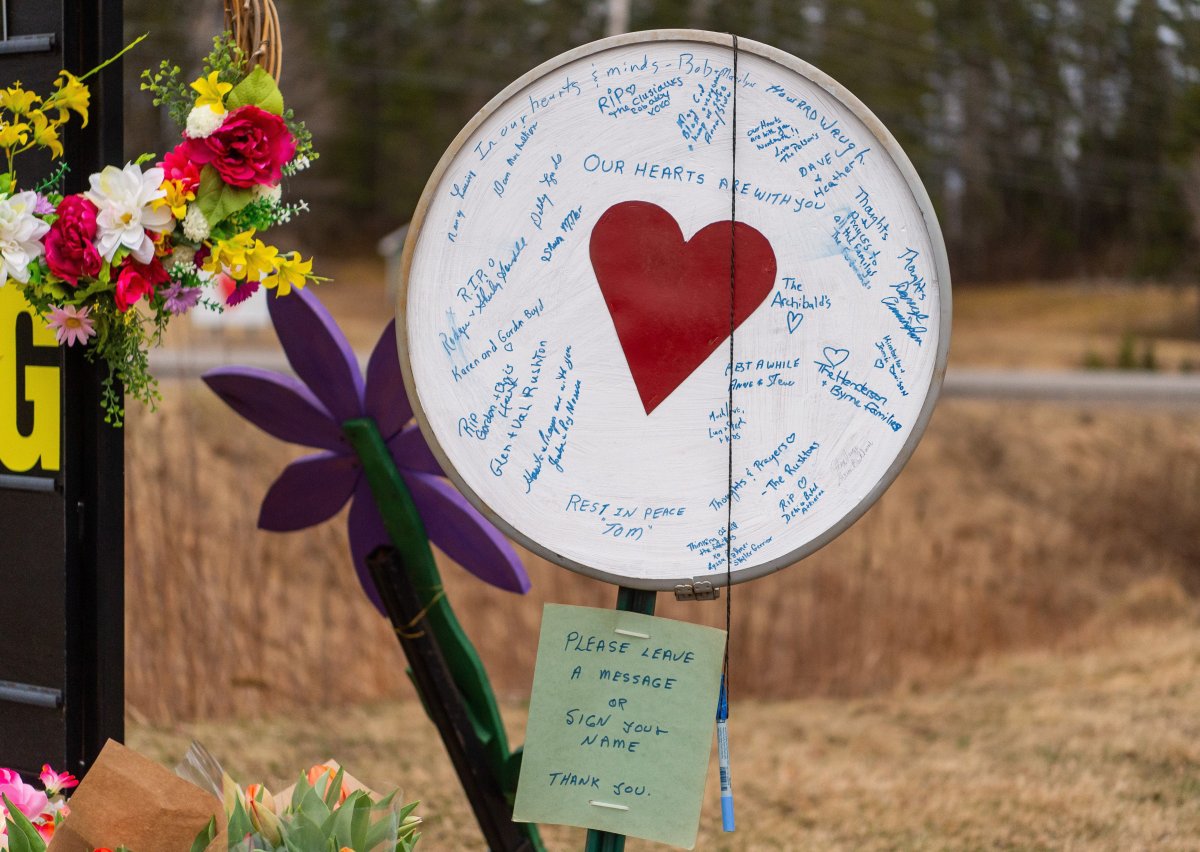The Nova Scotia government has again rejected calls for a provincial public inquiry into the shooting rampage last month that claimed 22 lives, arguing the federal government is better placed to investigate.

But Premier Stephen McNeil acknowledged Thursday there is merit to taking a closer look at domestic violence, which has been identified by police as a key factor behind one of the worst mass shootings in Canadian history
“We, as a government, have taken this (issue) seriously,” he told reporters by teleconference after a cabinet meeting.
READ MORE: Nova Scotia shooting: A detailed timeline of how the rampage unfolded
“But I also think there’s a broader role here for the men of our province, who need to stand up and send a very strong message that violence of any kind will not be tolerated. And as we raise our sons … we have to ensure that they recognize … that physical dominance of anyone is not acceptable.”
The premier said domestic violence was the most difficult issue he has had to deal with as a member of the legislature.
“This was a horrific event that happened in our province,” he said of the April 18-19 killings, noting that too many women in the province are “terrified to live in the home that they’re in.”
Witnesses say the killer had a prior history of domestic violence.

Get breaking National news
The Mounties say his rampage began in Portapique, N.S., on April 18 after a domestic assault involving his common-law spouse. Police have said she managed to escape into nearby woods where she hid until early in the morning of April 19.
- Alberta family navigates vacation death nightmare: ‘Basically stuck there’
- Wrestling legend Sweet Daddy Siki remembered across Canada for his greatness
- New year, new food? Here’s what to know about the top diets of 2025
- Calgarians get back personalized 1988 Olympic bricks: ‘We’ve done the impossible’
READ MORE: ‘Like a stab wound’: Children of N.S. shooting victims ‘struggling’ after tragedy
Last week 33 Dalhousie University law faculty members said Nova Scotia should lead a review of decisions made by the RCMP during the 13-hour rampage across northern and central Nova Scotia.
The professors want the inquiry to also consider broader social and legal issues that may have been contributing factors, including domestic violence.
McNeil said Thursday that the federal government “needs to be the lead” on any inquiry.
The premier said that in addition to the RCMP, other federal entities also deserve scrutiny, including the Canada Border Services Agency, given the fact that the killer was in possession of unlicensed semi-automatic firearms from the United States.
Provincial Justice Minister Mark Furey said the province has authority to conduct a public inquiry, but he stressed that it made more sense for Ottawa to do the job.
“There are provincial interests, (and) we have a role and a responsibility to play,” he said. “(But) we need the federal lead.”
Furey said he was also concerned about delays, noting that it took the province two years to organize a provincial inquiry to determine why former Canadian soldier Lionel Desmond fatally shot his mother, wife and daughter before turning the gun on himself in January 2017.
Five weeks after the mass killings in Nova Scotia, a community at the centre of it all is trying to move on by removing the reminders of the tragedy.
Tom Taggart, the councillor for the community of Portapique, N.S., says he’s been working with the victim’s families to remove what’s left of their burned homes.
“They will be cleaned up and we’re moving on, the community moves on, they want to move on and that’s what we’re going to do,” says Taggart.
The charred wreckage of the shooter’s home at 200 Portapique Beach Road, which was destroyed by fire, has also been bulldozed.
READ MORE: N.S. sets up help lines for citizens struggling amid mass shooting, pandemic
“It’s a reminder every day for the people that live in here,” he says.
Taggart says the cleanup should be complete by the weekend. He says they’ll also be moving the makeshift memorial at the top of Portapique Beach Road to a nearby church.
“We’re going to move everything up and consolidate it together, take everything down, and this is just going to be another road in Colchester County and we’re going to let these folks move on,” he says.
Discussions with affected communities are ongoing about a permanent memorial, but he says it’s too soon to know what that might look like.
“The sooner that we can get this behind us, the better.”
-With files from Global’s Ashley Field







Comments